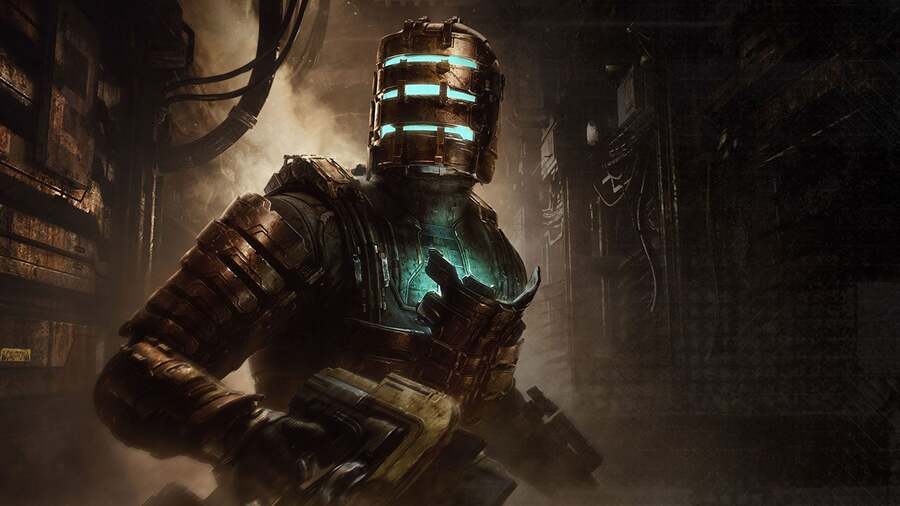
Dead Space is one of the best horror games of the PS3 era, and we were lucky enough recently to sit down with Trevor Gureckis, the composer of the excellent remake of the 2008 classic. We got to talk about how to make a horror soundtrack stand out alongside much competition, how to make music more emotionally resonant, and why nursery rhymes are such a good fit for a horror game. Join us as we dive into the world of planet-crackers, Unitology, and a hapless engineer named Isaac Clarke.
Push Square: As a remake of a pretty iconic game with a rather memorable soundtrack, what was your approach to the music? Did you explicitly want to distance yourself from the work of Jason Graves? Or did you want to pay homage to it, keep everything very much in the spirit of the original? Some blend of that?
Trevor Gureckis: I started out with a very narrow focus for my role in the remake of Dead Space. EA and Motive Studios really wanted to explore narrative opportunities throughout the game, utilizing new themes and new textures. So, at first, my main goal was to achieve this.
For instance, there are new themes for Nicole (Isaac’s girlfriend) that he is searching for on the USG Ishimura. I also explored new sounds and textures for the ship which include things like solo violin, solo cello, and percussion noises on metallic instruments like a welded instrument called the Marvin. But I did all of this in the universe of Dead Space, which Jason Graves did such a great job of developing over three games. So, I have that big full orchestra smashing away doing extended technique processes, and exploring the ugly sounds that are very familiar to gamers and listeners of the original score. The further the score developed over 18 months I began to write bigger and bigger cues for boss scenes and cutscenes. There aren't that many [cutscenes] but when they do happen, they [have] quite developed orchestral and solo instrumental pieces.
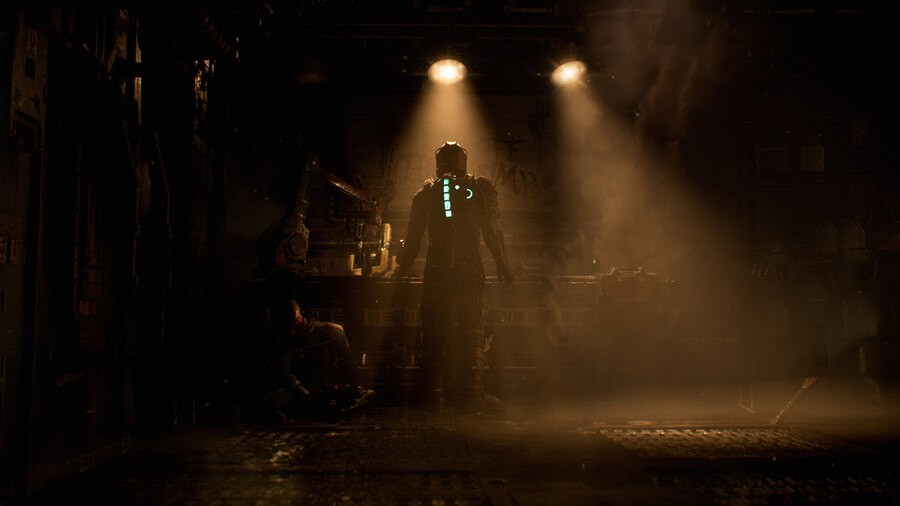
Making music for horror games (or movies for that matter) can be challenging to keep things interesting. There are certain expected sounds like tittering strings, and abrupt, explosive percussion. Did you make any efforts to distance the score from that type of sound, and if not, what measures did you take with your score to ensure it would stand out?
There are some cues that are in the horror genre outright, but I have plenty of music in this soundtrack and score in the game that is of the more ambient vibe with electronics and experimental performance techniques on instruments in which I tried to capture [the] inner space of Isaac. One thing that I wanted to explore in doing this remake is to find places and sonic worlds that could describe his personal journey to hell. That included lots of close-mic violins and cello body tapping and using the bow in unconventional ways.
Also with electronics: I used granular synthesis to manipulate recordings of previous recording sessions of the orchestra.
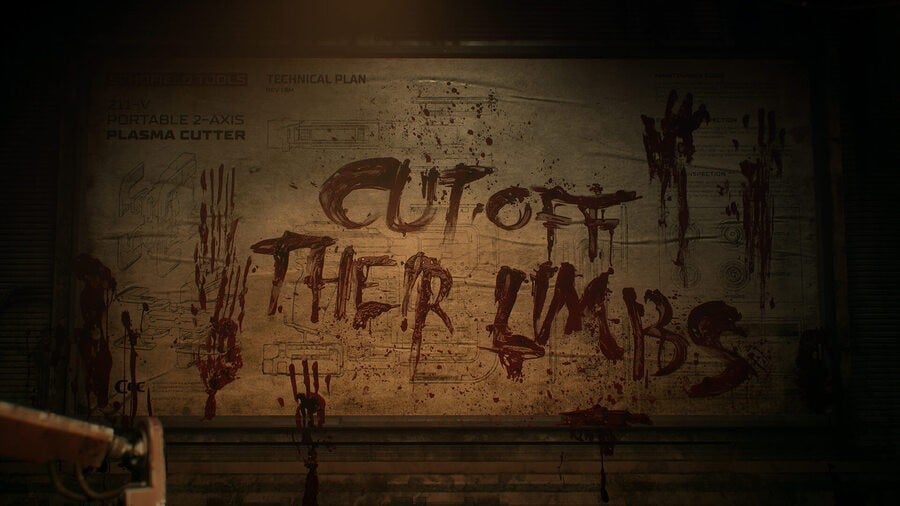
[Granular synthesis is a recording technique wherein samples of music are sliced into a large number of micro-samples, sometimes milliseconds in length, and then reconstituting them into a wholly different sound from what was originally created.]
So, Dead Space is a rather grotesque game. The Necromorphs are shining beacons of some of the very best in body horror. In what ways did the violence and viscera of Dead Space influence the way you approached the music? Did it impact it at all?
[The Necromorphs helped in trying to] capture high-energy. The most extreme sounds. [That] was always something I was in search of and [it was] absolutely inspired by the violence and viscera of Dead Space. I found it really thrilling to go after that challenge because, often, I can craft the creepy and unsettling quite easily after working with M. Night Shyamalan for all these years, but straight up...
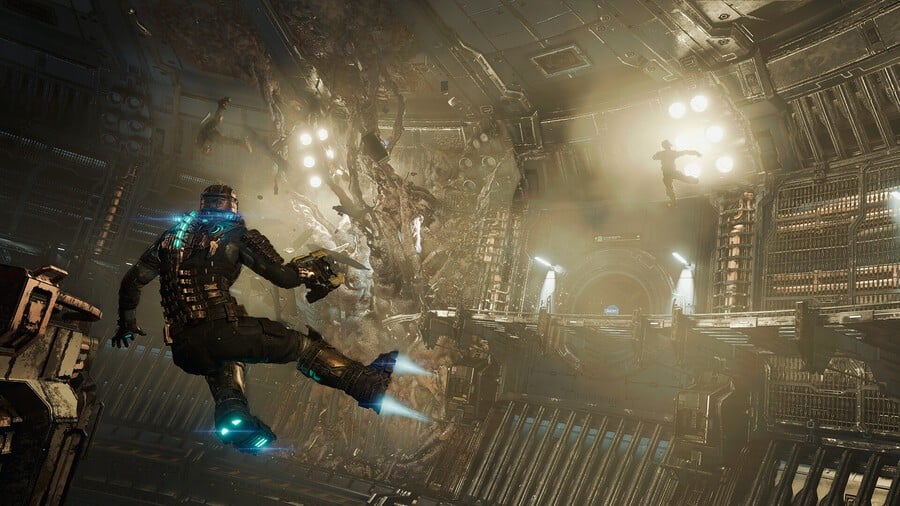
“That sounds horrible, what is happening!” For instance, how “The Hive Mind” starts – and when the arm wraps around you and there’s this whirling noise. 30 seconds later, you’re hit with a full choir going full-on scream. Figuring out that level of intensity was a great, fun challenge.
So as a follow-up to that, how did your approach change during down moments? Tension can only be maintained for so long, so how challenging or different was it for you to score the more reflective, quieter moments in the game? How about striking that balance between the quieter and tenser moments?
Right, so then backing off this high intensity was a great relief. And that was something that they really wanted to expand on: emotional beats in this remake. But there’s always something a little off even if I do step back as far as a solo piano piece. There might be some part of the harmony that’s “trapped” or “looped”. Like the videos Isaac replays of Nicole. There’s always a musical reason for this material as well. There’s a story logic to it, even if at the base level it can be more reflective and in a different emotional space.
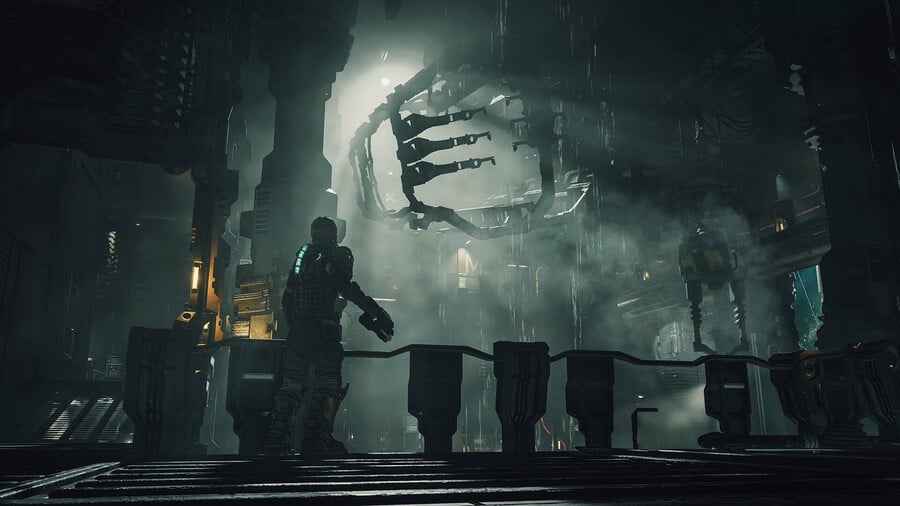
What kind of considerations did you take with different areas of the USG Ishimura? For the original version of the game, each area/level had a pretty distinctive look and feel to it. Did you want to reinforce those identities, or help give each new area a completely new feeling and personality?
Yes, we wanted to explore this idea – and I’m getting to see it now as I’m getting a chance to play the game myself. I didn’t do any of the music implementations, so I was working with big concepts and rough storyboards. One idea that the audio team (led by Olivier Asselin and James Wallace) had early on was that, as with Isaac’s journey on the ship, as he gets closer and closer to the Marker, things get more “corrupted”. He starts to imagine things. People start to lose their minds.
I wrote a series of pieces just on the topic of corruption as it related to the lore. One of them on the album [is] called “Hunger for the Stars”. For instance, in the game, the tram is a place where there is a music cue that gradually gets more and more “corrupted”. This means wailing solo cello parts, heavy heartbeat-like percussion, and woodwind riffs that kind of come out of nowhere. These parts are added bit by bit for Isaac’s journey, and likewise, the ship as [it] changes.
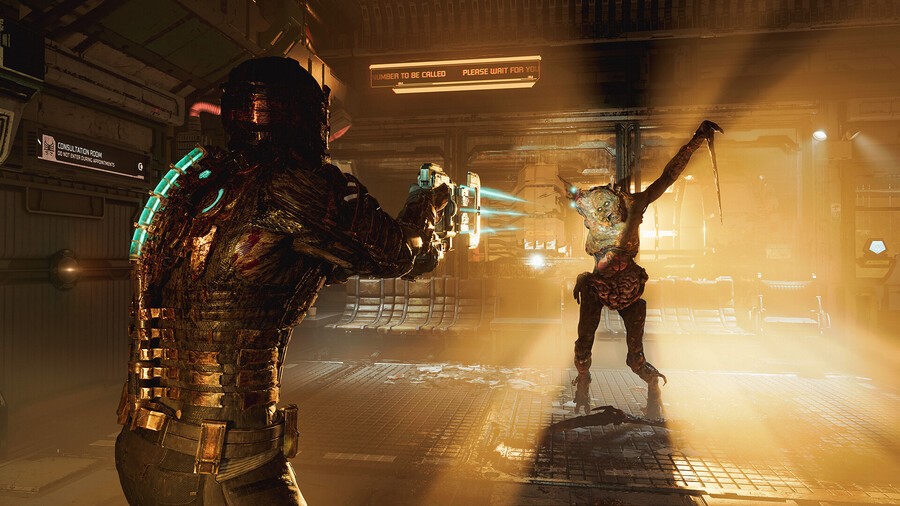
One of the popular tricks in the original game was Necromorphs playing dead and trying to attack Isaac to the tune of a jump scare, something that arguably happens too often. How do you feel about jump scares in general, and how did you approach moments like that when scoring the game this time? How did you try to keep it interesting as players progress further through the game?
I understand what you mean. From what I’ve played of the remake there’s a lot of variety, sonically. As the original mostly relied on full orchestra mixes, we have fine-tuned mix part separations (aka stems) from all my music - woodwinds, brass, strings, choir, synths 1, synths 2, etc. - so the level of detail for the stingers in the remake can be managed to much [greater] detail. I created some in cutscenes or even in exploration pieces that I wrote, but the bulk of the [ones] I’ve experienced in-game were edited from stems of bigger pieces of mine. Or [some] combination of the original score plus pieces of my stems. So, there’s a touch of cello, electronics, and voices here or there.
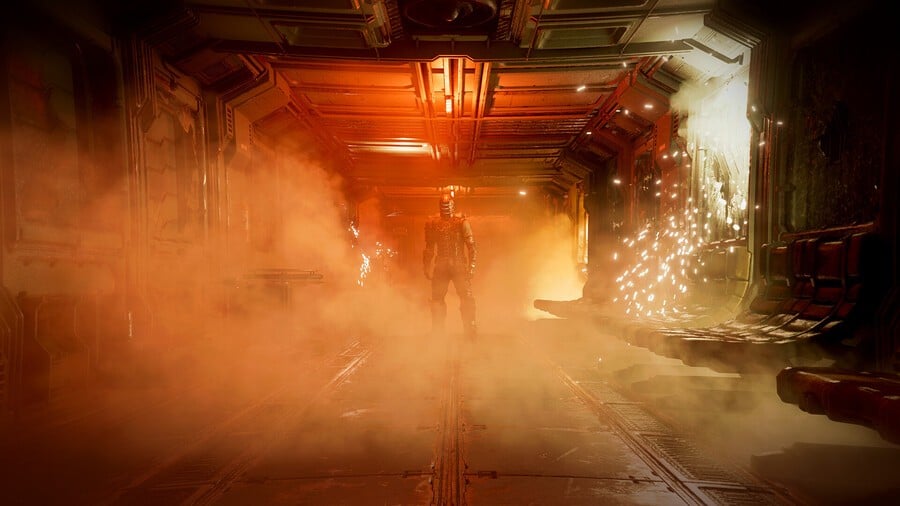
The Dead Space franchise has had some pretty iconic trailers making use of lullabies, with The Twinkle Twinkle Little Star trailer being a memorable highlight. How do you feel about those trailers from back in the day or their incorporation into the games? What was the process of working them into the music again?
That contrast — nursery rhyme for a space horror game — is what made it so cool! And it was so small and gentle against this epic and brutal experience. Really clever stuff. I did record two Twinkle Twinkle Little Star versions with a full women’s choir to be used in the game. I think they ended up going with a solo voice version for where they wanted to bring back the moment late in the game from the footage I’ve seen. It’s an interesting version, though. [It] has its own lyrics that are super dark that describe both Isaac and [the in-game religion of] Unitology.
I always like to close out my first-time interviews with a fun question! How’d you find yourself making music for video games? A lifelong ambition? A total accident? What brought you to games?
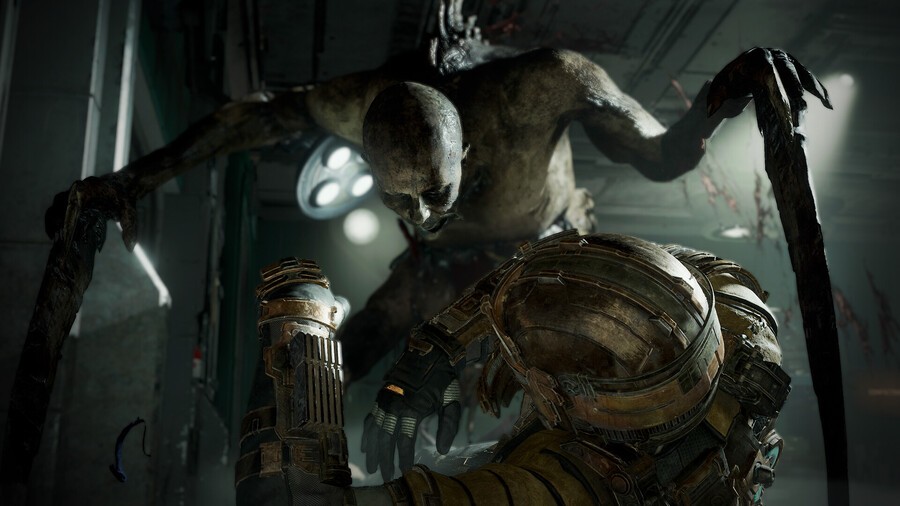
I’ve always wanted to work on a game, but got onto this, my first, by pure luck because some of the people at EA/Motive were aware of my score to M. Night Shyamalan’s Servant on Apple TV+. The final season is beginning to air now! And I think they thought that my experience with storytelling could be an interesting fit for the narrative goals they were after. I, of course, told them I played Dead Space on my Xbox 360 in 2008 and was very familiar with it. I think that helped sell them on my commitment to making a strong, faithful, and inventive remake. I hope to do more games soon!
Thanks for doing this Trevor!
Definitely! Enjoyed it.
Thank you again to Trevor for taking the time to talk with us! Have you been playing the Dead Space remake? What do you think of the new music? Like it? Make the comments whole again below.





Comments 6
I watched the entirety of Dead Space through streaming and the one thing that surprised me the most was the soundtrack. Trevor Cureckis absolutely killed it. The more atmospheric tracks bring such an ethereal vibe to the Ishimura, and they make it even more iconic. The zero gravity track is amazing. Really great work. Didn't think horror games could have such great OST's, but this game proved me wrong
I’ll be honest, I didn’t play the original and don’t plan on playing the remake. I just don’t do gore. But this was a great read! I like the idea of “corrupting” a theme through traditional instrumentation rather than processing. Fascinating stuff.
@KaijuKaiser "Dissecting Dead Composer" Lol It didn't happen to me but I've had it happen with other titles
Great interview, and I loved the subheadline.
Awesome interview. Absolutely fantastic horror soundtrack, up there with the greats. So much love for this Dead Space remake, it’s a horrifying dream come true.
@Amnesiac It's such a cool idea, and works really well, I'm almost done with the remake right now, and going in with what Trevor said about the music in mind made it that much cooler to hear!
@KaijuKaiser Bahaha, definitely not the intention!
@GreenTea The ones that stand out in horror are harder to come by, but when they stand out, boy do they stand out!
Leave A Comment
Hold on there, you need to login to post a comment...